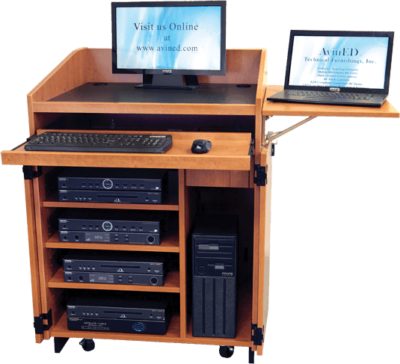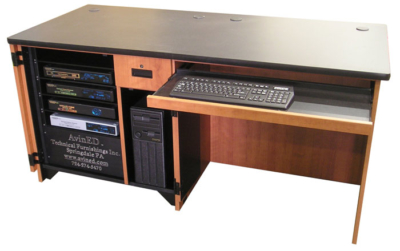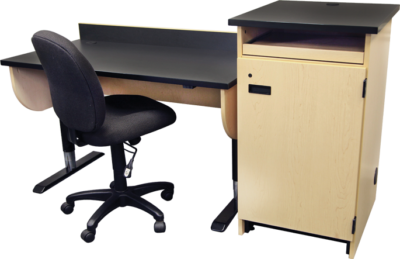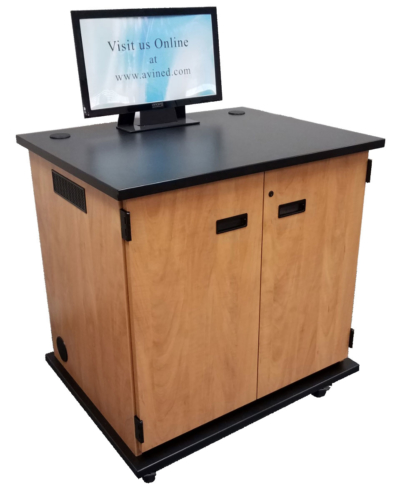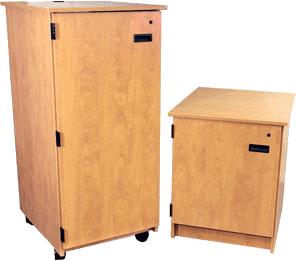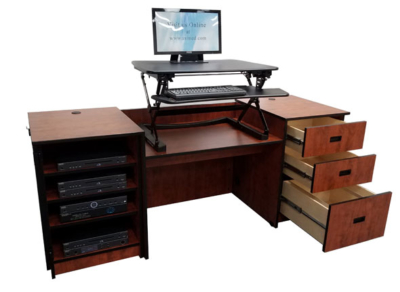
Many people who are handicapped face daily challenges within the classroom, workspace, or teaching environment. A lot of lecture halls, classrooms, or workspaces are not fully wheelchair accessible, providing a constant challenge to those who are handicapped. Having desks, podiums, lecterns, or combo podium desks that are customizable and meet ADA (Americans with Disabilities Act) requirements solve major obstacles that many disabled or handicapped people may face in their everyday life.
AvinED manufactures high-quality, durable teaching podiums, lecterns, and desks that meet all ADA requirements. Our customized furniture exceeds the standard set by the ADA stating that any public entity should have a facility or part of a facility, that is readily accessible to people who are handicapped or disabled. Classrooms and work settings are included in these requirements to ensure that all students, teachers, and employees are accommodated.
ADA, Wheelchair & Handicap Accessible Desks for Classrooms & Lecture Halls
ADA requirements vary based on the setting. Although the ADA has certain requirements for schools, all schools, or school districts, may not abide to these requirements. For example, in a classroom setting, the ADA states that at least five percent of classroom desks or tables must be handicap accessible. Tables must be between 28 and 34 inches high with at least 24 inches of knee clearance to accommodate students who may be in a wheelchair. While adjustable tables are not required, they are recommended. In lecture halls, seats must be at least 21 inches wide. Aisles in the lecture hall should be present to provide a connection between the teacher and the students. If there are any platforms in the room, ADA requirements state that there must be ramp access.
Not all school districts follow ADA requirements. According to Disability Scoop, last year, members of Congress were asking for a federal investigation into whether schools were actually in compliance with the ADA. In 2015, congressmen cited a report from the U.S. Attorney for the Southern District of New York which found that almost 83% of elementary schools in New York City were not fully accessible. This stirred much concern within the lawmakers as they feared that if the ADA compliance rates were so low in one of the wealthiest cities in the country, that the compliance rates may be even lower in other states, or school districts who are not as fortunate.
7 Principles to Consider When Becoming ADA Compliant and Wheelchair Accessible
When becoming ADA compliant, there are seven principles to keep in mind:
- Equitable use
- Flexibility in use
- Simple and intuitive use
- Perceptible information
- Tolerance for error
- Low physical effort
- Size/Space for approach & use into the design of a space or facility
“Equitable use” means that the design is useful and marketable to people with diverse abilities, while “flexibility in use” accommodates a wide range of individual preferences and abilities. “Simple and intuitive” use allows for an easy to understand design, regardless of the user’s experience, knowledge, language skills, or current concentration level. “Perceptible information” means that the design communicates necessary information effectively to the user, regardless of ambient conditions or the user’s sensory abilities. “Tolerance for error” means that the design minimizes hazards and the adverse consequences of accidental or unintentional actions. “Low physical effort” refers to the design being used efficiently and comfortably with minimum fatigue. “Size and space for approach and use” means that the appropriate size and space is provided for approach, reach, manipulation, and use regardless of user’s body size, posture, or mobility.
AvinED Manufactures ADA Compliant & Handicap Accessible Podiums, Lecterns, Desks & More
Knowing the requirements and regulations set by the ADA for any type of institution can be challenging, and knowing which products to choose for your institution can be even more challenging. With AvinED’s products already meeting these standards, there is no need for an institution to worry about whether or not they might meet these requirements.
AvinED incorporates all seven principles into our designs and models, and our products are both equal and flexible in use. Not only do our desks, podiums, and lecterns meet ADA requirements, but they can also be customized, adjusted, or added onto, allowing for them to accommodate many different needs for many different users. Our products are also simple and intuitive in both their practicality and design. With our accessible settings, AvinED creates a better way for any type of user to easily adjust their podium, desk, etc. based upon their needs. Because our products are convenient for any user, there is a high tolerance for error, simultaneously making it safe for any user. Check out our wide variety of models, including units that can be ordered with adjustable height desk tops for standing or sitting, today!

